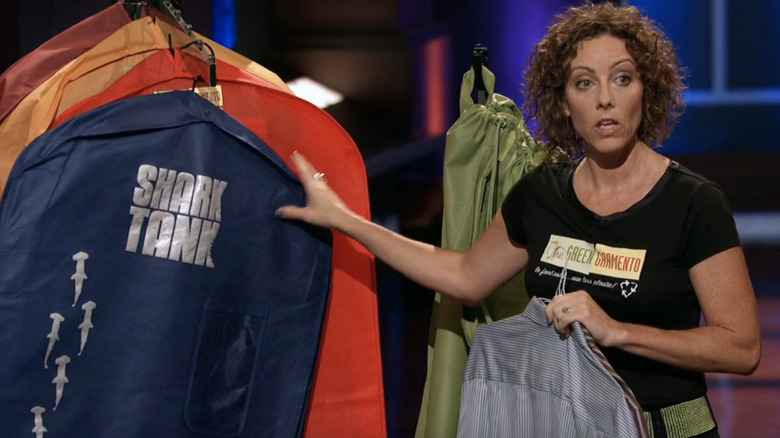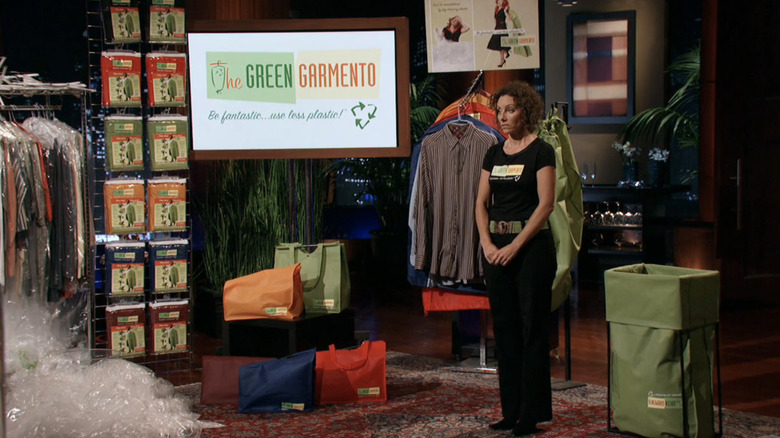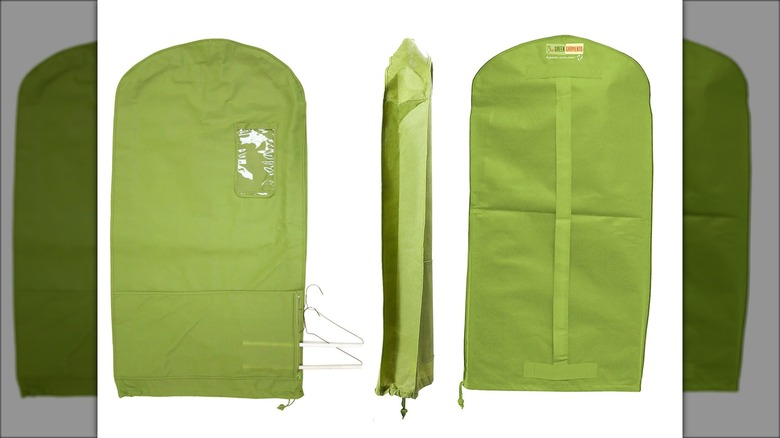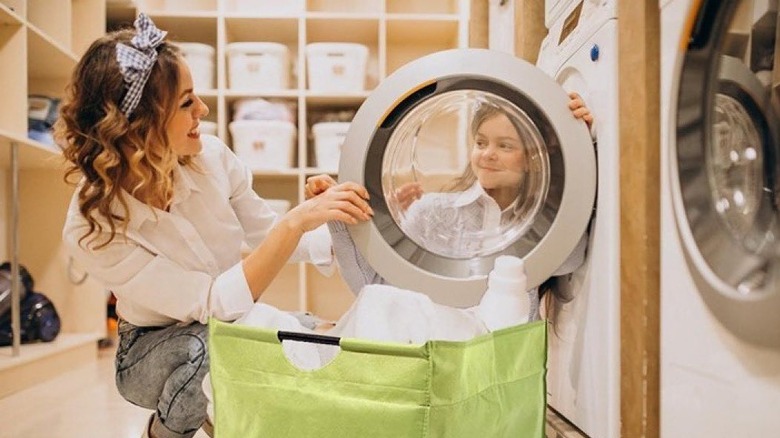Whatever Happened To Green Garmento – EcoFriendly Laundry Bag After Shark Tank Season 4?
In the many seasons of "Shark Tank," lots of environmentally conscious products — such as Outer and FryAway — have been served up before its panel of sharks. Following suit, business owner Jennie Nigrosh presented her company Green Garmento and its eco-friendly dry cleaner bags on Season 4, Episode 15 to try to strike a deal. The aim of The Green Garmento is to replace the single-use plastic bags that most dry cleaners use to sort clothes. According to Nigrosh, this results in 300 million pounds of discarded plastic each year.
Nigrosh started the company with her husband in 2008. Armed with the slogan "Be fantastic ... use less plastic," The Green Garmento dry cleaning bags were meant to have two functions — a dirty laundry bag you can strap over your shoulder like a duffel bag to bring to the cleaners, and a sorting and collection system your dry cleaner can use to repackage your garments after cleaning. The Green Garmento also offered customization on its dry cleaner bags, which Nigrosh said is a benefit for dry cleaners who want to use the product as a marketing tool.
What happened to Green Garmento on Shark Tank?
Jennie Nigrosh came to the Sharks asking for $300,000 for a 20% stake in The Green Garmento and noted that the business was set to hit its first $1 million in sales that month. She quickly charmed the judge's panel by saying that the plastic waste from dry cleaner bags threatens marine life, including sharks and wildlife like Mr. Wonderful (Kevin O'Leary). The judges were initially open to her pitch, but as soon as they delved into the numbers behind The Green Garmento, Nigrosh's pitch began to show its cracks.
After some light probing, Nigrosh revealed that she and her husband had taken on an astounding debt of $900,000 with 9% interest. She also stated that after four years in business, the company still had yet to make a profit, which gave all of the Sharks pause. When asked for the finer details — such as the cost of manufacturing per bag — Nigrosh floundered and was only able to give ballpark ranges. Robert Herjavec said that his dry cleaner had actually tried to switch to reusable bags and it was a logistical disaster, and Barbara Corcoran said she'd be buying into a problem — both said they were out. Marc Cuban expressed great concern over Nigrosh's lack of knowledge of her finances and opted out as well. O'Leary and Daymond John also decided against buying into The Green Garmento, which meant Nigrosh walked away from "Shark Tank" without securing a deal.
After Shark Tank
Failing to secure a deal on "Shark Tank" might seem like the end of a business, but in fact, while a slight majority of "Shark Tank" pitches end in an on-air deal, even less of those deals actually close. And for The Green Garmento and Jennie Nigrosh, the episode was just the beginning. In 2013, Nigrosh did an interview with Pax Stereo TV to discuss how the episode went and revealed she believed her biggest mistake was not having her husband Rick Siegel on with her, because he was more familiar with the financial side of the company.
Mistakes aside, Nigrosh carried on and didn't give up The Green Garmento. The bag was then featured on a number of news channels and talk shows, including "Today" segment about trending housewares. In a 2013 interview with NBC Chicago, Nigrosh was asked if the show was a benefit for the company, and she didn't hesitate to say yes. She went on to say, "We've had great exposure. ... We have lots of buyers from different big stores coming to visit us, and it definitely did help us, and helped us also get more consumers and dry cleaners on board."
Though The Green Garmento appeared on "Shark Tank" roughly a decade ago, its branding seems to have remained the same. Its logo appears unchanged, as are the product photos — most feature women doing 1950s housewife caricatures with vibrantly colored wigs and high heels.
Is The Green Garmento still in business?
The Green Garmento is still in business and offers direct-to-consumer and factory-direct wholesale options for the signature eco-friendly reusable garment bag. The company now also offers totes, bedding bags, and wash-and-fold bags. On the company's "About Us" page, it's reported that The Green Garmento bag can be found in nearly 1,000 dry cleaner shops in the United States. The site also states that they are used in many hotels, including The Hyatt, Four Seasons, Fairmont, and more. In 2022, Nigrosh appeared in an interview with Now Team to talk about her success with the company and said, "We're certainly not a huge business. We struggle like everybody else ... but we have a huge vision."
The Green Garmento may be doing even better than it did after its appearance on "Shark Tank." Despite their mark-up compared to regular, non-green products, sustainable products continued to take up a larger part of the market share in 2022, per a Circana and the New York University Stern Center for Sustainable Business report. In the episode, O'Leary said that consumers are only interested in saving the environment as long as it doesn't cost them financially, but as climate change becomes a greater presence in the day-to-day, that may not be as true today as it was in 2013. The Green Garmento might have benefited from a rapid growth in environmental consciousness from everyday consumers.
What's next?
While there isn't much public press about The Green Garmento's future, it does seem to be doing well. According to the company's LinkedIn page, there are only three employees: Jennie Nigrosh, Rick Siegel, and Analiz Suárez Campos. Many successful businesses face rapid expansion when they hit a stride, but The Green Garmento's success recipe apparently relies on keeping the organization tiny and tidy.
The Green Garmento has had a few products added to its roster over the years, so further expansion into this category is possible. But all the way back in a 2010 interview with The New York Times, Siegel emphasized that the company was not selling products but environmental awareness and how to make small changes that make a big impact, saying, "We're not so much selling our bag as publicizing the concept of the bag." The driving force behind the company is likely to remain: "Be fantastic ... Use less plastic."



